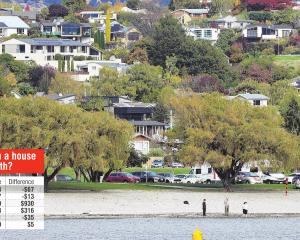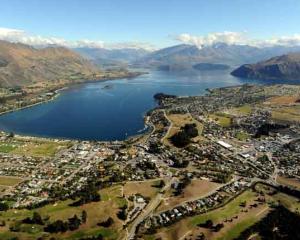
The Longview Environmental Trust has become a party to a resource consent appeal by Second Star Ltd, a company associated with US tech billionaire Peter Thiel.
The trust, associated with Emerald Bluff resident John May, lodged a notice to the Environment Court Christchurch registry this week.
It is the second organisation to line up behind the defendant, the Queenstown Lakes District Council.
The other party to the appeal is the Upper Clutha Environmental Society, which lodged its notice to the Environment Court earlier this month.
The trust and society both oppose Second Star Ltd’s application to build a luxury lodge, owner’s pod and associated buildings on a 193ha block of farmland at Damper Bay, near Wanaka.
A council-appointed independent hearings panel rejected the application in August.
The trust’s notice says it has four issues: visibility of the proposed building from roads and public spaces, adverse effects on landscape values in the Mt Alpha outstanding natural landscape, the extent to which the site can absorb development and whether the proposal is consistent with the district plan.
"The proposal does not protect the values of the Mt Alpha ONL. The decision [of the hearings panel] was correct . . . the conclusions made in the decision with respect to visibility were not surprising," the trust’s notice says.
Second Star’s notice of appeal mentions the hearing panel did not reconvene after visiting the development site.
The trust said it was "entirely orthodox" for the panel to evaluate evidence from its own site visit and "testing the veracity of expert evidence through a site visit is a matter well within the expertise of the hearing panel".
In New Zealand, the Environment Court hears a case de novo — from the beginning — and appeals are not confined to reviewing the law.
All appeal parties go through a mediation process first, to see if an alternative resolution is possible or to reduce the number of issues to be heard by the court.
Environment Court costs vary depending on the complexity of the issues.
Meanwhile, society president Julian Haworth said the society has decided to pick its battles defending Queenstown Lakes district plan rules for developing in the outstanding natural landscape.
The society is also battling the Queenstown Lakes District Council over a decision not to study all Upper Clutha landscapes.
However, the society does not have resources to join as a party to another Environment Court appeal regarding a rejected, multimillion-dollar development by Nature Preservation Trust (NPT).
This is also in the outstanding natural landscape, close to Second Star Ltd’s property .
"The society can’t afford to join the NPT appeal process; it is the council’s job to defend its decision," Mr Haworth said.
"We have to pick our fights and over the last eight years the fight has been the district plan.
"We have achieved a lot on the district plan. The development rules are clearer and tighter and the landscape studies will push rural development into places that can absorb it," he said.
The NPT lodged an appeal inJuly against an independent hearing panel’s decision torefuse resource consent to knock down a mansion built in the late 1990s by aviation identity Ray Hanna and replace it with a much larger but substantially subterreanean house.
The decision to refuse consent hinged on the "reasonably difficult to see" test in the district plan.
The council declined to comment as the matters are before the court.












